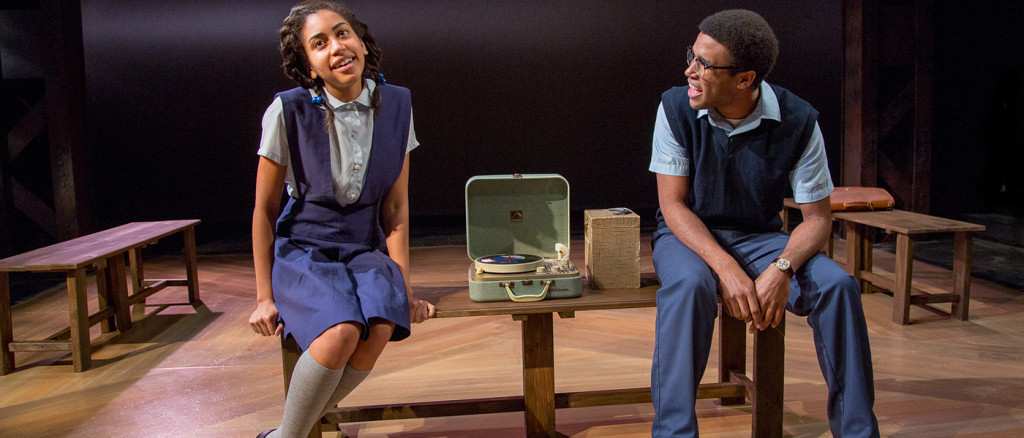Judy Tate’s Slashes of Light begins by upending a familiar Hollywood template. That’s where the heroic white teacher (think Michelle Pfeiffer or Sandra Bullock) brings discipline and hope to urban black students.
Not this time. In Slashes, the new white teacher, Mrs. Hedges (Sarah K. Chalmers), might be gutsy enough to walk alone across the south side of Chicago, but she is carrying unseen baggage. Far from being a ghetto war zone, her new middle school is a private academy where the girls wear uniforms and the kids pass copies of C.G. Jung’s Man and His Symbols among themselves. The white teacher is but a catalyst in helping a precocious girl named Sunny (Judi Jackson) find her compass in the turbulent year of 1966.
An actor and Tisch School graduate, playwright Tate has won four Emmys and a Writers’ Guild of America Award for both stage and television work with such shows as Days of Our Lives and As The World Turns. She and director Melissa Maxwell have been workshopping Slashes since 2010. Its world premiere in Ithaca (running through June 29) is produced jointly by the always innovative Kitchen Theatre Company and the lesser-known Civic Ensemble, dedicated to new works.
Ravi Rakkulchon’s set presents us with a rather Spartan school: three hard, wooden platforms because the school has only three students. Confronting Sunny is the talkative, angry Kaleb (Jelani Pitcher) and the distant, seemingly morose Stephen (Ryan Hope Travis). Kaleb is a nascent black nationalist, evocative of the younger Stokely Carmichael, contemptuous of integrationists like Dr. Martin Luther King, while Stephen would rather walk away than speak at all.
At the rear of the set stand the legs of an iron railway bridge, like a second proscenium, behind which railway cars pass in the dark. They are explained by Chicago poet Carl Sandberg’s “Window,” whose three lines Sunny recites and Mrs. Hedges recognizes immediately, “Night from a railroad car window/ Is a great dark, dark, soft thing/ Broken across with slashes of light.” The spectral Conductor (Robert McKay) speaks in a golden baritone with different accents in different scenes. Here we will learn the dreams of the three school kids as well as the recollections that Mrs. Hedges would like to delete from her memory bank.
Neither Sunny nor the other students at the school are deprived. Her only parent might be her father (baritone Robert McKay again), but he’s an OB-GYN medico. She and the boys include music in their exchanges, starting with a vintage, portable 45 rpm turntable. Sunny speaks her preference for lyrical folksinger Joan Baez and anti-Vietnam War protest songs. Kaleb might be no supporter of the war, but he considers her ignorance of black musical idiom as personified in, say, Sonny Boy Williamson, to be cultural heresy.
The somewhat older Stephen plays the guitar, which Sunny would like to master. In some of the most amusing, and G-rated erotic scenes, Stephen holds Sunny and the guitar in his arms and guides her fingers over the frets.
Both boys sass Mrs. Hodges. There is nothing G-rated in Stephen’s sullen remark that she has “nice legs.” More aggressively, Kaleb shouts that black suffering is the only conflict that matters and that Mrs. Hodges could not possibly understand it because she has lived such a sugarcoated life. This leads her to lash out at last, shouting that he knows nothing of what she has suffered.
Despite moments of bleak outrage and pathos, Slashes of Light is full of good humor and laugh-out-loud funny moments. Playwright Tate has lots of things to talk about, and she does not want to lose your attention or favor.
As splendid as this production is, with Lisa Boquist’s costumes and Tyler M. Perry’s exquisite lighting, its chief success rests with some extraordinary casting. Judi Jackson, a student at Virginia’s University of Mary Washington, stands about 5-feet-7 but somehow looks age 12 on the stage. She speaks more than half the play’s lines in vibrant emotional colors. Hers is a coruscating and enchanting professional debut. Ryan Hope Travis, the new head of Syracuse’s Paul Robeson Performing Arts Company, also scores big as Stephen, a Mr. Darcy with street smarts.



